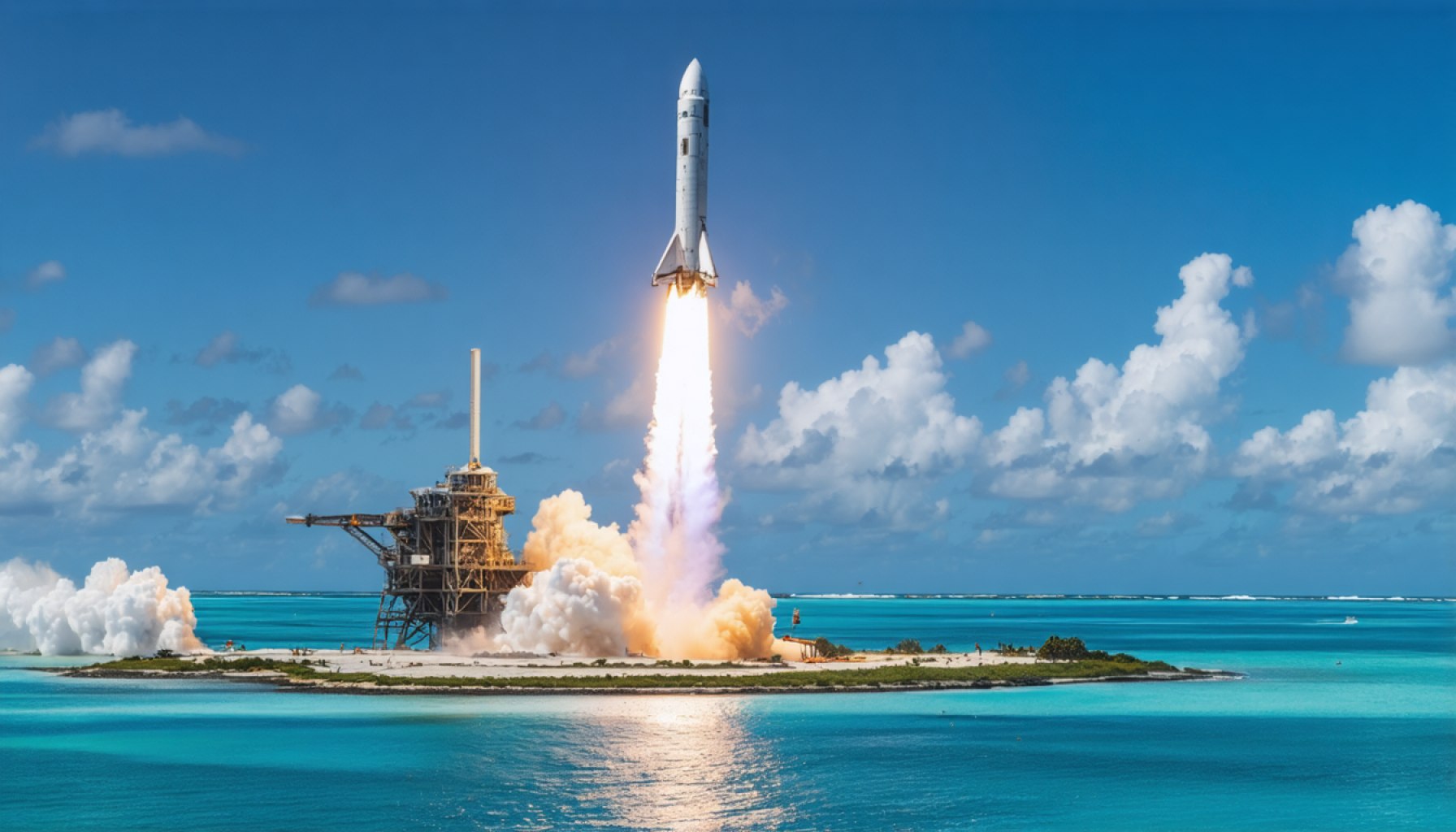- SpaceX’s successful Falcon 9 rocket landing near the Bahamas has led to regulatory scrutiny and suspension of future landings due to environmental concerns.
- The Bahamian government emphasizes the need for a comprehensive environmental assessment to balance technological advancement with ecological protection.
- Concerns may have been heightened by the recent reentry of SpaceX’s Starship vehicle, which scattered debris, prompting careful consideration by Bahamian authorities.
- SpaceX remains optimistic about aligning operations with local regulations and environmental standards, aspiring to strengthen collaboration with the Bahamas.
- The scenario highlights the challenge of harmonizing space exploration with environmental sustainability, stressing the importance of long-term impact assessments.
- The pause in rocket landings invites global stakeholders to explore innovative solutions that ensure technological strides complement planetary health.
Against the backdrop of azure Caribbean waters, SpaceX achieved another milestone with its Falcon 9 rocket landing smoothly off the coast of the Bahamas. However, this technological triumph brought with it a wave of regulatory scrutiny from the island nation, now halting any future prospects of similar feats.
The Bahamian government’s decision to suspend further SpaceX landings pivots on the critical need for a comprehensive environmental assessment. This move highlights the increasing tension between technological advancement and environmental stewardship—a balance crucial for the sustainability of both innovation and ecosystems. The vibrant marine life and fragile ecosystems in the Bahamas serve as a reminder of nature’s inherent beauty and vulnerability, underscoring the necessity for careful assessment before proceeding with potentially disruptive activities.
Amidst this suspension, questions linger about whether the pause was influenced by the recent dramatic reentry of SpaceX’s Starship vehicle, which showered the region with debris. This event, distinct from the typical Falcon 9 operations, may have intensified concerns, prompting Bahamian authorities to adopt a more cautious approach.
SpaceX, synonymous with cutting-edge space exploration, remains optimistic about establishing routines that harmonize with local regulations and environmental safeguards. The potential for up to 19 additional Falcon 9 landings initially painted an exciting trajectory for collaboration with the Bahamas, promising to expand orbital launch angles and operational flexibility. Yet, these aspirations face a crucial test as they hinge on the outcome of environmental diligence.
The intersection of space exploration and environmental conservation offers a modern conundrum: how to push the boundaries of what’s possible while safeguarding the planet. This scenario unfolding in the Bahamas underscores that responsible growth must contemplate the long-term impacts on all frontiers—terrestrial and extraterrestrial. As global stakeholders, the onus is on us to chart a course where technological progress complements rather than compromises the planet’s vitality.
Ultimately, the pause on Falcon 9 landings is a call to action for deeper collaboration and innovation that bridges space exploration with sustainable practices. This narrative serves as a beacon—a chance for the world to envision a future where our quest for the stars is as sustainable as it is ambitious.
The Surprising Impact of SpaceX Rocket Landings on Bahamian Shores
Understanding the SpaceX and Bahamas Saga
SpaceX has achieved remarkable feats in space exploration, including the recent successful landing of its Falcon 9 rocket off the coast of the Bahamas. However, this technological triumph has sparked significant regulatory scrutiny from the Bahamian government, leading to a suspension of further landings until a thorough environmental assessment is completed.
Key Issues and Concerns
Environmental Impact
The Bahamas is renowned for its vibrant marine life and fragile ecosystems, making environmental preservation a top priority. The government’s halt on SpaceX activities underscores a critical tension between innovative technological progress and environmental conservation. Before moving forward, a detailed assessment is necessary to ensure that the rocket landings do not disrupt local ecosystems.
Influence of Recent Events
Questions have risen about the influence of the recent SpaceX Starship vehicle reentry, which scattered debris across the region. Although distinct from the Falcon 9 operations, it may have amplified concerns and contributed to the Bahamian government’s decision.
Future Prospects for SpaceX
SpaceX remains hopeful about collaborating with the Bahamas, aspiring to conduct up to 19 additional Falcon 9 landings. Although the suspension presents a hurdle, it opens a dialogue for establishing robust frameworks that align space exploration with environmental stewardship.
The Broader Implications
Innovations in Environmental Regulations
The situation in the Bahamas exemplifies the modern challenge of balancing technological development with ecological responsibility. It highlights the necessity for regulatory frameworks that can adapt to technological advances without compromising planet vitality.
Lessons for Global Stakeholders
This scenario serves as a pivotal moment for global stakeholders, encouraging deeper collaborations that bridge technological aspirations with sustainability. The pause offers an opportunity to develop strategies ensuring space exploration advances complement environmental conservation.
Actionable Recommendations
1. Conduct Comprehensive Environmental Assessments: Prioritize detailed studies examining potential impacts of rocket landings on marine ecosystems.
2. Develop Clear Regulatory Frameworks: Collaborate with international experts to create guidelines for balancing technological progress and environmental conservation.
3. Enhance Community Engagement: Engage local communities in discussions to ensure their concerns and insights inform decision-making processes.
4. Innovate Sustainable Technologies: Invest in cutting-edge research to develop technologies minimizing ecological footprints.
For those interested in the intersection of technology and sustainability, visit SpaceX for more information on their ongoing efforts to achieve sustainable space exploration.
Final Thoughts
The suspension of Falcon 9 landings in the Bahamas is a call to action for integrating innovation with sustainable practices. By embracing environmental stewardship, we can envision a future where our quest for the stars is pursued without compromising our planet’s health. This delicate balance is essential for safeguarding the Earth while expanding the frontiers of space exploration.
